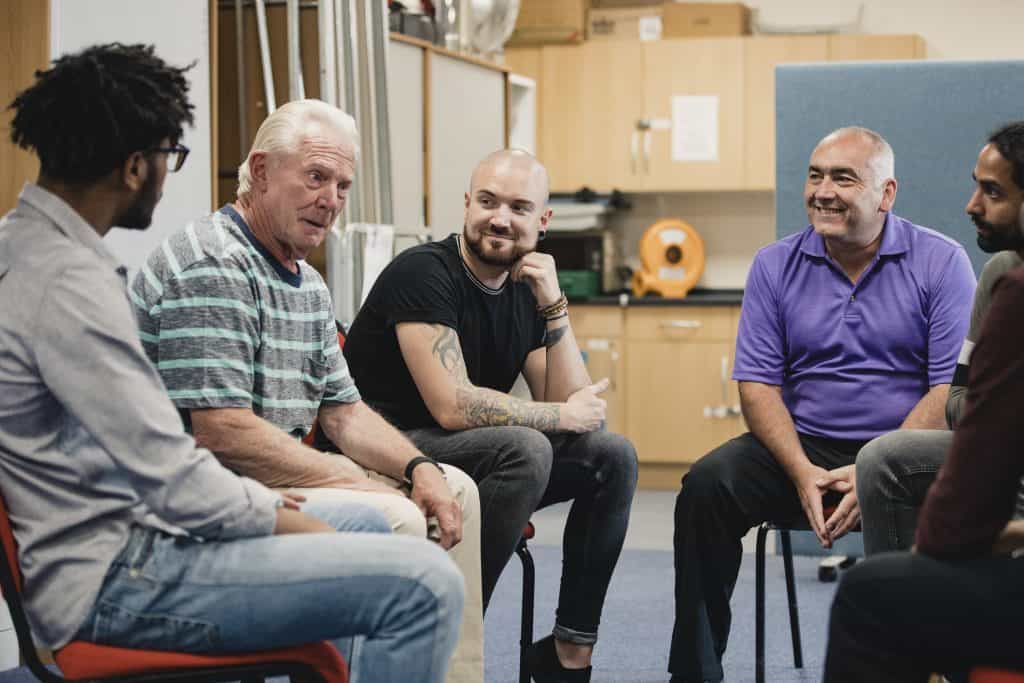If you’ve read Covenant Eyes’ articles before, you’ve probably heard about the need for accountability relationships. A good accountability partner is essential in our fight against porn. But accountability is really a sub-category of the larger concept of mentoring. In broadest terms, a mentor is a role model. Mentors influence us by their words and actions.
I’m convinced we all need mentors–not just those in the sexual recovery process. I think it’s a necessary part of our spiritual-psychosocial development. God designed us this way.
Based on both my understanding of the Bible and human development, I would further argue that those who have healthy mentoring relationships thrive where others do not—especially when facing adversity. I want to share three reasons from neuroscience and the triune brain theory why we all need mentors. [1] I speak as one who has been blessed with many mentors of my own, including my father, and who has had the privilege of mentoring many others.
Mentors Influence the Development of the Gut Brain
What I call the Gut Brain is part of the Enteric Nervous System. Only recently have scientists come to appreciate that the lower gastrointestinal tract, connected to the lower regions of the upper brain via the vagus nerve, is in fact a functional brain. It processes information via tiny microscopic messages called gut microbiomes.
You may have never heard of the Gut Brain before, but you certainly know how it communicates because you have felt it when it speaks. The flutters or butterflies in your stomach when you are nervous or excited are the Gut Brain “talking” to you, alerting the rest of the brain that something significant is happening.
What does this have to do with mentoring? Though the Gut Brain is involved in basic functions like digestion and immune response, it also significantly affects how we view our relationships with others. Those relationships–both the good and bad ones–also shape and influence the Gut Brain.
Maybe you’ve heard about the Romanian orphan children and the studies of what happened because they lacked healthy relationships in the orphanage system. Even long after they left the orphanage, many adopted into caring, loving homes, their adult brains and relationships continued the patterns of early neglect and isolation. A large percentage still deal with debilitating anxiety, depression, and other fears.
In my counseling practice with sex addicts and the sexually broken, this pattern of early relational trauma is nearly universal. Most did not have good role models as children. But as a student of the triune brain, it is even more complex than just a lack of good mentors in the past. Gut Brain patterns established in those early experiences of neglect and detachment still influence our thoughts, feelings, and actions today. No wonder it’s so hard to break the chains of sexual bondage. The Gut Brain itself has to be transformed.
Related: 6 Ways to Raise a Sex Addict
Mentors Influence the Development of the Heart Brain
In the terminology of triune brain theory, the Heart Brain describes neural connections from the mid-sections of the brain to the actual heart muscle. Biologically, the vagus nerve is connected to this “Autonomic Nervous System.” I can’t take time to explain the fascinating science and how it impacts our feelings and emotions, but I want to emphasize how mentors influence this part of the brain.
It is a bit simplistic, but when explaining the Heart Brain development to my clients, I emphasize the way we process our emotional memories from the past and how that influences our feelings in the present. Emotions themselves result from tiny neurotransmitters being released and absorbed inside the body. We all know what emotions feel like. But what causes us to feel them in the first place? It’s complicated, but basically it is because the release of “molecules of emotion” like epinephrine, dopamine, and serotonin become associated with particular experiences filed away in our memory.[2]
Why particular combinations of these neurotransmitters are released in given situations directly relates to activity in the Heart Brain. When those memories got stored in the subconscious, many also included the feelings we had at the time. God designed this system to equip us to handle the experiences of life—the good, the bad, and the ugly. He also made us so that mentors have an enormous influence in this process.
How we understand those memories and what they mean is a direct outcome of the mentors and role models in our lives.
As a kid, my mom taught me not to touch a hot stove and not to run out into the street when traffic was going by. How? She warned me with words, but also her emotions. When I was six years old, my dog ran into the busy road in front of our house. Determined to protect him from getting run over, I darted out after him. I have long forgotten the exact words my mom spoke, but I’ll never forget the emotions with which she spoke them! They are permanently stored in the recesses of my Heart Brain. And now, when my children or grandchildren put themselves in potential danger around busy roads, those old patterns of memory are activated once again.
What if your mentors and role models communicated inaccurate or even destructive emotions in your early years? How has that affected the development of your own feelings today? I see this almost universally in working with sex addicts. Some of the earliest memories influenced by significant role models involved sexual temptation, sexually reckless attitudes, or even abuse. This was accompanied by particular emotions displayed by the role model that resulted in certain feelings in the child.
Counselors working with male sex addicts sometimes emphasize the problem of objectification and dehumanization of women. But where and how did that begin? Long before a sex addict becomes trapped by a pornography addiction, he has experienced a particular pattern of feelings and emotions that became part of the infrastructure of his Heart Brain. A significant percentage of those were influenced by adults, older siblings, and other role models—many of which were not good influences. This is why I say that mentors from the past influence the development of the Heart Brain today and another reason why breaking free of an addiction is so difficult. We don’t just have to change our behavior. We have to also change the way we process our emotions.
Related: What Your Sexual Fantasies Might Say About You (Part 2)
Mentors Influence the Development of the Head Brain
Finally, mentors influence the Head Brain. The Head Brain just describes the highest region of the brain—what we traditionally recognize as the brain including three regions: the corpus callosum, the temporal lobes, and the pre-frontal cortex. They are uniquely developed in humans and, in my view, reflect the special place humans have in God’s creation. The Head Brain is the seat of our higher consciousness, directly involved in processing self-awareness, symbolic interaction (language), and moral judgment.
I probably don’t have to tell you how important mentors are in this part of our brain development. Where do our ideas of right and wrong come from? What about the language we use to communicate with others? And how about that mystery we call “self-image”? All these are directly influenced by the mentors and models in our lives.
Mentors: Good and Bad
I’m sure by now I’ve made my point: our very brains are shaped and molded by the significant others in our lives, especially those relationships we call role models. But I hope you have also noted my point that we don’t just need mentors—we need “good” ones. The case could be made that we all have mentors and models. Even those Romanian orphans had them. The problem is so many of our mentors are not good ones, and we have to recognize the negative influence they’ve had and have a plan to deal with it.
Chances are your mentor history has been a mixed bag. And when we talk about how important it is to have good mentors and models in the earliest years, if you did not, you may feel even more trapped by your experience. But here is the amazing fact: it is not too late to reap some of the profound benefits of a good mentor in your life. Even as adults, mentoring continues to shape the triune brain. We never outgrow the need for healthy relationships in the Gut Brain, for accurate perceptions of reality in the Heart Brain, and for true understanding of ourselves and our world in the Head Brain. Good mentors are absolutely vital for that kind of influence. What’s more, the old dysfunctional brain circuitry can actually be transformed. It’s called “neuroplasticity”—a topic often discussed in the addiction literature.
Related: Neuroscience Speaks–How Using Porn Destroys Your Willpower
Finding a good mentor will probably not be as easy as being influenced by a bad one. However, I believe since God designed us this way, he also wants to put one in your life.
In my experience, the best mentors are not necessarily the ones we expect or even want. When I think about my first mentor, my dad, I didn’t appreciate what a great role model I had for many years. In fact, like most teens, I would likely have rejected the suggestion that I need to view him as my role model. I’m not suggesting that all fathers make good role models. Tragically, many are not. But I’m saying that we often fail to appreciate the good things God has put in our path.
Even if you cannot identify a good mentor at the present time, seeing the necessity for your own spiritual psychosocial development, would you be willing to pray right now that God would bring you someone?
[1] The Triune Brain Theory was first articulated by Paul MacLean in the 1960s, a Harvard neuroscientist. It simply says that humans don’t just have one brain but three. In the generation since MacLean, we have discovered that the brain is even more complex than MacLean realized and so some of the particulars of his theory have been rejected. Even so, the basic idea of three brains remains a very useful way for us to understand and talk about the brain. MacLean called them the Reptillian, Mammalian, and Neo-Mammalian brains, reflecting his Darwinian assumptions about brain development. I don’t accept those assumptions, though I like the three-fold division. I prefer to label them Gut, Heart, and Head Brains.
[2] Neuroscientist Candace Pert did groundbreaking work on this topic in her influential book, The Molecules of Emotion: The Science Behind Mind, Body Medicine, 1999.








The hardest thing I ever did as a christian was find a man to mentor me. I lost my dad to a drunk driver when I was 11, took me until I was 28 to find a man to show me how to be a man. Had to drive 60 miles one way to be part of his church. Worth it.